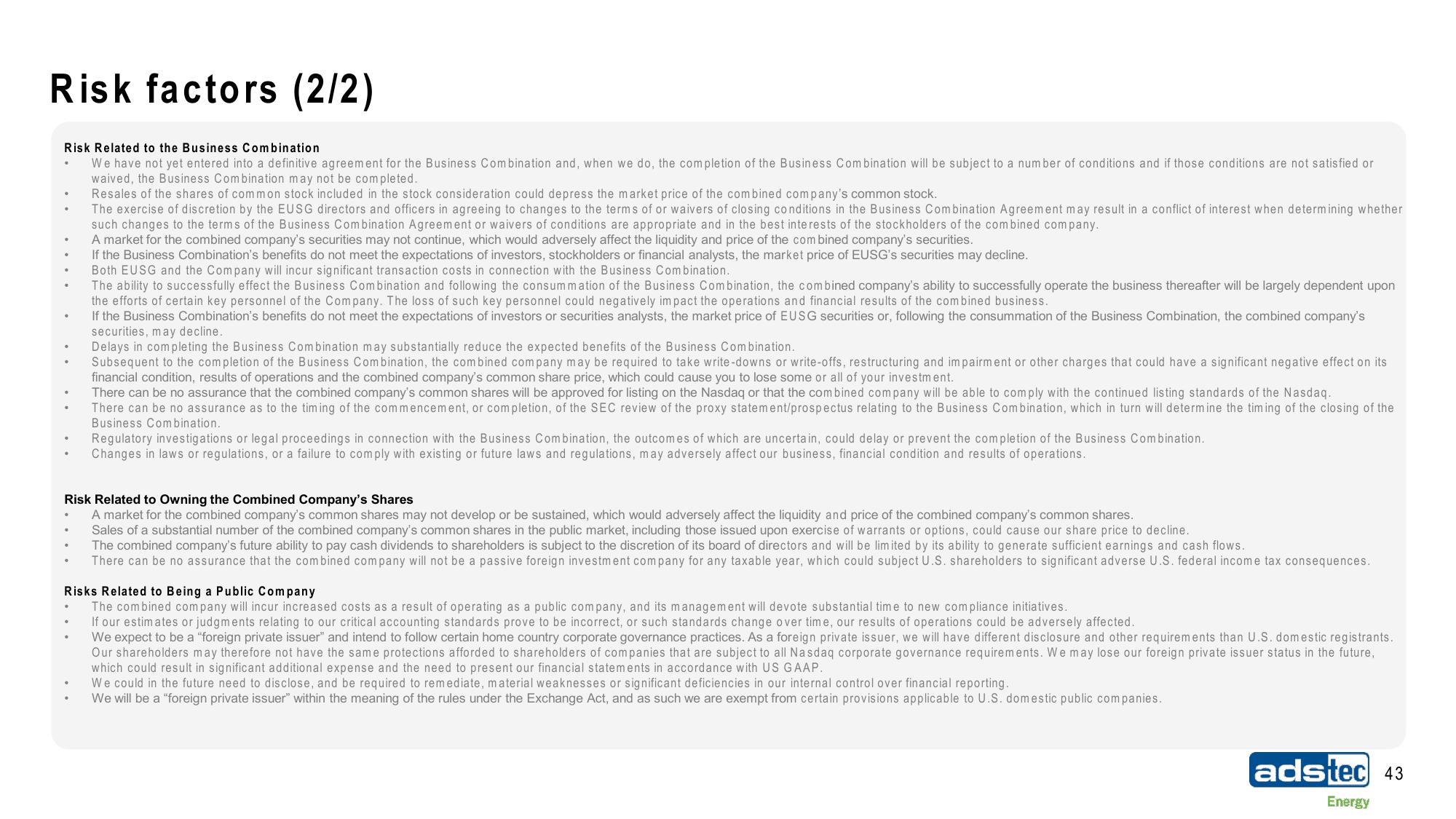ads-tec Energy SPAC Presentation Deck
Risk factors (2/2)
Risk Related to the Business Combination
We have not yet entered into a definitive agreement for the Business Combination and, when we do, the completion of the Business Combination will be subject to a number of conditions and if those conditions are not satisfied or
waived, the Business Combination may not be completed.
Resales of the shares of common stock included in the stock consideration could depress the market price of the combined company's common stock.
The exercise of discretion by the EUSG directors and officers in agreeing to changes to the terms of or waivers of closing conditions in the Business Combination Agreement may result in a conflict of interest when determining whether
such changes to the terms of the Business Combination Agreement or waivers of conditions are appropriate and in the best interests of the stockholders of the combined company.
A market for the combined company's securities may not continue, which would adversely affect the liquidity and price of the combined company's securities.
If the Business Combination's benefits do not meet the expectations of investors, stockholders or financial analysts, the market price of EUSG's securities may decline.
Both EUSG and the Company will incur significant transaction costs in connection with the Business Combination.
The ability to successfully effect the Business Combination and following the consummation of the Business Combination, the combined company's ability to successfully operate the business thereafter will be largely dependent upon
the efforts of certain key personnel of the Company. The loss of such key personnel could negatively impact the operations and financial results of the combined business.
If the Business Combination's benefits do not meet the expectations of investors or securities analysts, the market price of EUSG securities or, following the consummation of the Business Combination, the combined company's
securities, may decline.
Delays in completing the Business Combination may substantially reduce the expected benefits of the Business Combination.
Subsequent to the completion of the Business Combination, the combined company may be required to take write-downs or write-offs, restructuring and impairment or other charges that could have a significant negative effect on its
financial condition, results of operations and the combined company's common share price, which could cause you to lose some or all of your investment.
There can be no assurance that the combined company's common shares will be approved for listing on the Nasdaq or that the combined company will be able to comply with the continued listing standards of the Nasdaq.
There can be no assurance as to the timing of the commencement, or completion, of the SEC review of the proxy statement/prospectus relating to the Business Combination, which in turn will determine the timing of the closing of the
Business Combination.
Regulatory investigations or legal proceedings in connection with the Business Combination, the outcomes of which are uncertain, could delay or prevent the completion of the Business Combination.
Changes in laws or regulations, or a failure to comply with existing or future laws and regulations, may adversely affect our business, financial condition and results of operations.
Risk Related to Owning the Combined Company's Shares
A market for the combined company's common shares may not develop or be sustained, which would adversely affect the liquidity and price of the combined company's common shares.
Sales of a substantial number of the combined company's common shares in the public market, including those issued upon exercise of warrants or options, could cause our share price to decline.
The combined company's future ability to pay cash dividends to shareholders is subject to the discretion of its board of directors and will be limited by its ability to generate sufficient earnings and cash flows.
There can be no assurance that the combined company will not be a passive foreign investment company for any taxable year, which could subject U.S. shareholders to significant adverse U.S. federal income tax consequences.
Risks Related to Being a Public Company
The combined company will incur increased costs as a result of operating as a public company, and its management will devote substantial time to new compliance initiatives.
If our estimates or judgments relating to our critical accounting standards prove to be incorrect, or such standards change over time, our results of operations could be adversely affected.
We expect to be a "foreign private issuer" and intend to ollow certain home country corporate governance practices. As a foreign private issuer, we will have differe à disclosure and other requirements than U.S. domestic registrants.
Our shareholders may therefore not have the same protections afforded to shareholders of companies that are subject to all Nasdaq corporate governance requirements. We may lose our foreign private issuer status in the future,
which could result in significant additional expense and the need to present our financial statements in accordance with US GAAP.
We could in the future need to disclose, and be required to remediate, material weaknesses or significant deficiencies in our internal control over financial reporting.
We will be a "foreign private issuer" within the meaning of the rules under the Exchange Act, and as such we are exempt from certain provisions applicable to U.S. domestic public companies.
adstec 43
EnergyView entire presentation